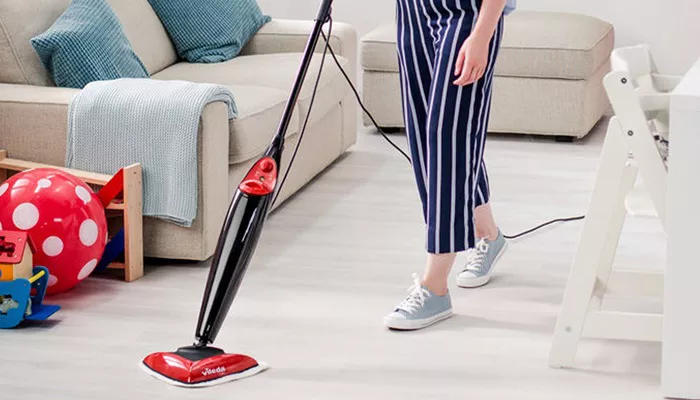A new vacuum cleaner is getting some attention online for one of its features: alerts for text messages and incoming calls.
A new refrigerator lets users play quiz games and watch videos on its big screen, while a washer/dryer combo can display incoming calls on its screen when connected to a phone.
As appliance makers rush to add “smart” features and artificial intelligence to new products, one question remains: Are these features something people want?
All of these products are made by Samsung as part of its new Bespoke AI line. But Samsung isn’t alone. GE touts its “AI kitchen, laundry and shopping innovations,” such as a refrigerator that suggests recipes based on photos of food. LG says its “Affectionate Intelligence takes care of everyone in your home.”
Industry watchers disagree about what’s driving manufacturers’ all-in on AI and smart appliances, some of which have controversial capabilities. (“Smart” means connected, while AI appliances are marketed as more advanced.) Surveys and some online reviews suggest consumers aren’t buying it, at least not yet.
Perhaps part of the inspiration is to generate media buzz — like this one. Some people on social media reacted strongly to a The Verge article about Samsung’s new vacuum cleaner technology.
Stacey Higginbotham, a policy researcher at Consumer Reports, believes companies are embracing AI in part because they want to create “novel objects that attract attention.”
“Every year at CES, you see appliance manufacturers unveil new wow features. In the past few years, connectivity and AI have been those features,” she said.
Or they may just be throwing out ideas and seeing what works.
“A lot of times, they’re testing new use cases,” said Rick Kowalski, senior director of business intelligence at the Consumer Technology Association, an industry trade group, “to see what products might be popular and what products might be of interest to consumers in the next few years.”
Samsung told NPR that the integrated calling and texting features on its appliances are “designed to keep users connected during everyday activities like doing laundry or vacuuming. These Wi-Fi-enabled features provide an extra layer of convenience, especially when users may not have their phones handy.”
To be fair, Samsung’s marketing around its new upright vacuums and washer/dryers has focused on their actual cleaning and washing prowess, respectively, rather than on texting and calling. (Although the company envisions a future where its appliances have “screens everywhere.”)
Higginbotham said she has a countertop oven with a camera and a graphics processor. “When I put food in, it says, ‘Hey, is this a chicken breast?’ And you say, ‘Yeah, yeah.’ And then it does the cooking for me,” she said, monitoring the temperature with a preset recipe.
Companies and AI proponents also say new AI devices often incorporate features to maximize energy efficiency.
For example, a washer/dryer can “automatically monitor the volume and weight of the load to estimate the amount of detergent, water and heat needed for each wash,” Kowalski said. Samsung says its upright vacuum cleaners can automatically detect floor type to optimize suction for each type of carpet, saving battery power.
The devices themselves also have greater potential to help diagnose problems and recommend maintenance when they occur.
“Connectivity in the appliance category really opens up a lot of opportunities to provide consumers with new information,” said Elizabeth Parks, president and chief marketing officer of Parks Associates, which specializes in consumer technology market research and works with some manufacturers.
“How much electricity is being used? Is that tied to the bill? Are there alerts about the appliance’s performance? You know, especially the energy-saving part that can translate into money saved,” she said.
Gathering data about how their products are used and how they perform over time is another big reason companies are pushing AI and smart appliance technology. They want to turn what was once a one-time purchase into an ongoing relationship.
“It creates a service model, right? You sell a major appliance, like a refrigerator or a washer-dryer, and then you maybe sell the maintenance that goes with it,” Parks said.
Of course, any device connected to the internet carries the risk of hacking and privacy breaches. Consumers should be aware that these devices require software updates, and, as Consumer Reports found, their support deadlines aren’t always clear.
Appliance manufacturers “will probably stop updating their ovens at some point,” Higginbotham said. “When they stop providing security updates, I’ve got a vulnerable device on my network, so I need to take it offline.”
For those who don’t have experience with smart appliances, however, experts NPR spoke to said that the core functionality of most appliances should remain even when the device is offline.
Related topics:

